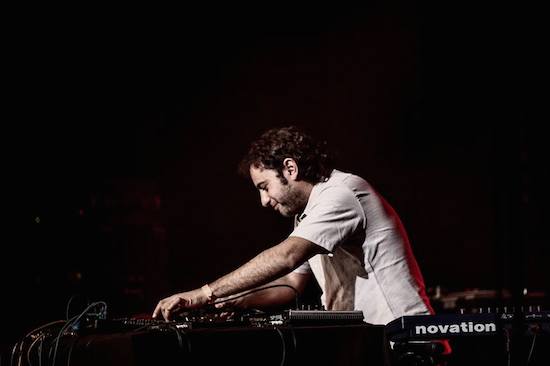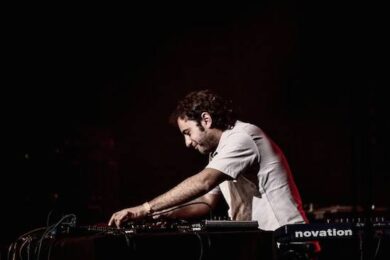Photo by Joeri Thiry
I have a confession to make. Were it not for The Quietus – John Doran in particular – I might not have heard of Maurice Louca at all. I was in Cairo at the time preparing for an interview with Mahmoud Refat of 100 Copies when I got an email asking me to ask Mahmoud about the album Maurice had just released, Benhayyi Al-Babaghan (Salute The Parrot). Doran went on to tell me that the album was incredible, and he wasn’t wrong. From there my listening tastes and knowledge of Middle Eastern experimental music were set on a journey. Louca, with his style of tape loops and sampling, merges the traditional with the contemporary in a Middle East and slightly Western fusion. Maurice isn’t exactly a newcomer to music either – in Cairo, he lends his music to numerous projects, composing for theatre, film and contemporary art, as well as being the co-founder of the bands Bikya, Alif and Dwarves of East Agouza.
But this evening, I find myself at Café Oto for Maurice’s first UK show, with a quite a sizeable number of Arabic speakers in attendance. Its also my first time at Oto and in good time too – as opening support John Bence is about to play. Bence is a producer who with his one sampler onstage emits waves and drones that’s both harmonic and noisy. It’s pretty interesting to listen to up to a point and just where we think it’s all going pretty linear, a loud drone sound jolts our attention.
The Egyptian-Canadian composer Sam Shalabi is up next, sitting down in front of a laptop with an Oud and guitar to the side of him. A one-time ex-punk rocker back in the late 70s, he initially begins on a somber note with Shalabi just playing the Oud for about 5 minutes or so. A nice, gentle, tranquil sound of the Middle East took a hold of us – or at least it did so temporarily. Sam then moves onto opening up his laptop and switches to electric guitar mode, whilst using samples from radio static, street sounds and white noise. There also a fusion of different styles being used such as jazz, chaabi, improvisation, experimental and traditional Arabic music. After that warm, fuzzy wall of sound calms down, it’s back to the Oud for more classical variations.
Not too long afterwards, Maurice Louca assembles a big table of experimental goodies. Flanked on both sides of the Egyptian composer are a bassist and drummer where he can count both of them in to the songs and raise his hand to halt them. He opens with ‘Al Asr Adh-Dhahabi (The Golden Age), which has a slow build up of the track itself played via a filter. Eventually, crashing drums and bass riffs join in with Maurice as the songs ends to a grinding halt via Louca’s raised hand. Via complex time signatures, Maurice, in the last year, has sought to find a particular, specific sound for his work.
You get the feeling that he’s close to finding it with Benhayyi Al-Babaghan, as it doesn’t quite get much better than this, judging by tonight. Why? Because on both sides of the room there are groups of people dancing, especially after Al-Mashoub (The Idiot) where it all starts to get a little bit more upbeat. There’s real presence and a certain energy between the trio that binds them well together. They’ve not been a band for too long, but you wouldn’t think it by watching or hearing them. Nowadays, Maurice rarely plays solo shows as he’s placed an emphasis more on fleshing out his sound for more of a live experience. Towards the end, they play out ‘Malnash Diyah (Spineless)’, which get the crowd moving whether sitting or standing. It’s a nice surprise to see music that’s normally considered as staid, getting people moving – to massive applause.
<div class="fb-comments" data-href="http://thequietus.com/articles/19083-live-report-maurice-louca-review” data-width="550">



